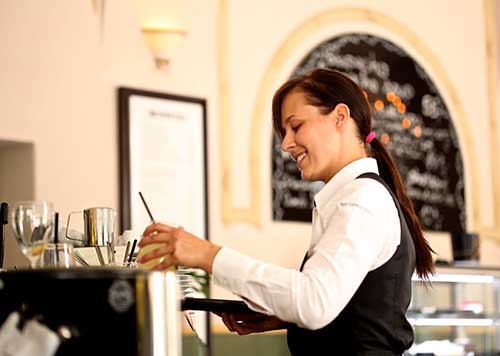Not every culinary career is destined for the kitchen, and many culinary school graduates pursue front-of-house positions, including those in food and beverage management.
Many students from both culinary programs and hospitality management programs go on to successful careers in food service management.
The Institute of Culinary Education also offers a Dual Diploma program, with a tuition discount offered when students pursue more than one course of study, such as Plant-Based Culinary Arts, Pastry & Baking Arts or Culinary Arts, plus a business-focused program such as Restaurant & Culinary Management.
What is Food and Beverage Management?
Food and beverage management involves the operation and administration of establishments such as restaurants, bars and hotels that provide food and drink services. Other businesses that have food service operations on site, such as hospitals, schools, churches or even corporate environments might also employ food and beverage managers.
Dr. Katie Chamberlain, Director of Online Education and Dean of Hospitality Management at ICE, says the primary functions of food and beverage management are multi-faceted.
“The goals are to efficiently deliver high-quality food and beverage services, optimize profitability, and enhance overall customer satisfaction,” she says. “The food and beverage management role encompasses various responsibilities including menu planning, procurement of ingredients, cost control, staff management, customer service and ensuring compliance with health and safety regulations."

What topics are typically taught in Food and Beverage Management programs?
“Food and Beverage Management programs cover a range of topics to equip individuals with the knowledge and skills needed for managerial roles in the hospitality industry,” Dr. Chamberlain says.
The Restaurant & Culinary Management program at ICE encompasses topics that break down into nine primary core functions, including:
- Concept Development and Menu Design
- Culinary Marketing
- Food Safety
- Purchasing and Cost Control Supervision
- Staff Management
- Legal Issues
- Service Management
- Finance and Accounting
- Beverage and Wine Management
- Facilities and Design
According to Dr. Chamberlain, “These topics collectively provide a comprehensive understanding of managing food and beverage operations, from kitchen efficiency and culinary creativity to business acumen and customer satisfaction.”
Related: Understanding Restaurant Food Safety
Besides floor manager and general manager positions in a restaurant, bar or hotel setting, there are a number of food service management roles that specialize in a particular aspect of restaurant or hospitality administration, such as service director or beverage director, which can be lucrative career paths for Food and Beverage Management graduates. Additionally, many restaurant groups have higher-level food and beverage management roles whose function interacts with numerous properties within the parent company, such as director of operations, director of restaurants or director of bars.
Should aspiring chefs also study Food and Beverage Management?
Studying both food and beverage management and culinary arts is beneficial both for those who intend to pursue kitchen roles as well as those who intend to pursue management roles, as the functions of both are inextricably intertwined.
“Studying food and beverage management is crucial for aspiring chefs seeking to advance into leadership or managerial roles,” Dr. Chamberlain says. “This education provides essential business acumen, enabling chefs to contribute to menu development, pricing strategies and operational efficiency. Chefs with management skills are better equipped to enhance customer service, adapt to industry trends and pursue entrepreneurial opportunities.”
Related: Should I Go to Culinary School?
Culinary programs are obviously crucial for learning cooking techniques for those aspiring to be chefs, but those who will eventually go on to be executive chefs will also frequently be involved with the administrative and operational functions of their restaurants. Studying food and beverage management early also helps to signal ambition to prospective employers.
Do career changers with previous management experience still benefit from studying Food and Beverage Management?
Many people attend culinary school as career changers, whose previous experience might have already included various management functions. Even if a student has non-hospitality management experience, Dr. Chamberlain still recommends food and beverage management programs in most cases.
“Food and beverage management provides industry-specific knowledge, insights into culinary operations and networking opportunities,” she says. “This education [helps facilitate] a smooth transition into the dynamic culinary and hospitality sector, offering a deeper understanding of menu planning, customer service, industry trends, and regulatory compliance. Additionally, the program enhances leadership skills in the context of culinary operations, providing a unique and tailored skill set for managerial roles in the food and beverage industry.”
Related: How I Used My Culinary School Education Outside of the Kitchen






